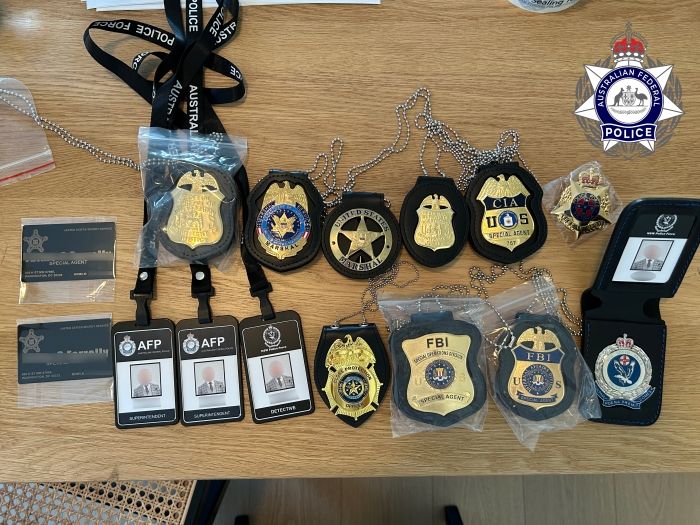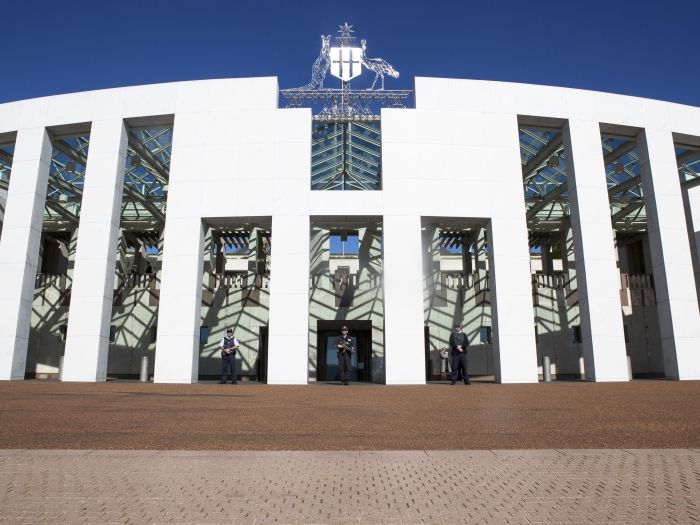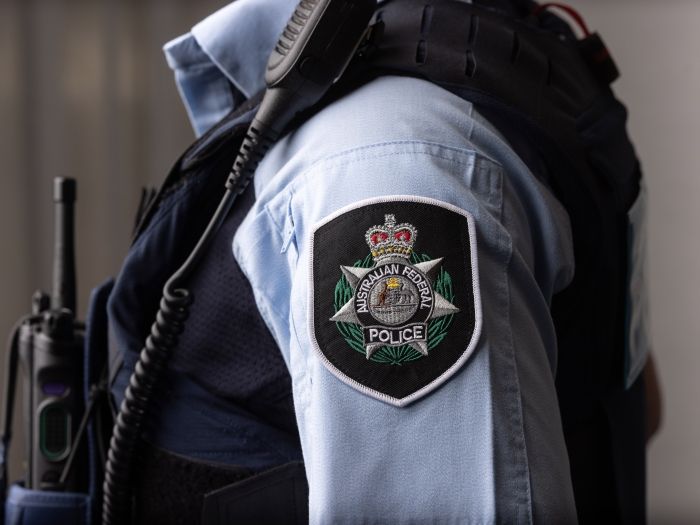National Press Club address by AFP Commissioner Krissy Barrett
Thank you for coming today, and I particularly want to thank those of you who I have personally invited.
Today, I want to have a candid and open conversation with Australians to inform them about the risks they need to know about, and how the AFP will disrupt and combat these threats through our taskforces, our operations and our capability.
Some of this conversation will be confronting, but as Commissioner, I want to empower communities by providing information they need to know.
One of my priorities is to protect vulnerable communities and our future prosperity, which includes our youth and future generations.
For many – including busy parents, and I am one of them – trying to navigate the two worlds our kids live in – the physical and the virtual – is like trying to understand two languages, two different friendship groups and two sets of norms.
And then there’s the never-ending battle to protect our curious kids from mis and disinformation and the dangerous online echo chambers that offer few alternative views.
It’s no wonder many parents and others are exhausted and drained by the online world.
If it used to take a village to raise a child, because of advances in technology, it now takes a country to keep them safe.
In an unpredictable world, where so many Australians are looking for answers and assurance – I say to you as your AFP Commissioner – you can trust the AFP.
You can rely on me and the very dedicated members of the AFP to provide relevant, timely and truthful information about what is happening in the world and how to best mitigate these criminal threats.
And I want Australians to know; we will be with you – you are not alone.
Because the AFP exists to protect Australia. We exist to serve you. We are your AFP.
Today, I will outline a worrying threat that we are still learning about in Australia, and why we all need to vigilant.
There are decentralised online crime networks and loosely affiliated individuals in Australia and offshore who are glorifying crime online, such as sadistic online exploitation, cyber-attacks and violence.
These crimes are now spilling into the real world and have real world consequences.
While these networks do not have a centralised hierarchy or a single ideology, they are prolific and are attracted to violent extremism, nihilism, sadism, Nazism and satanism.
They are crimefluencers, and are motivated by anarchy and hurting others, with most of their victims pre-teen or teenage girls.
These networks, which I will not name because it will validate the notoriety they crave, are a new and disturbing front in traditional gendered-based violence.
Overwhelmingly, the perpetrators are young boys and young men from Western English-speaking backgrounds.
Overwhelmingly, young girls are the victims, and they are being intimidated, exploited and controlled.
Typically, these young girls have low self-esteem, mental health disorders, history of self-harm, eating disorders or other attributes that may lead them to seek connection online.
This can make them more vulnerable to being targeted directly by these networks.
The motivation of individuals within these networks is not financial nor is it for sexual gratification – this is purely for their amusement – for fun – or to be popular online without fully understanding the consequences.
These groups have a similar culture to multi-player, online gaming culture, and hunt, stalk and draw-in victims from a range of online platforms.
To be accepted into these networks, the perpetrators often have to pass a test or undertake a task, such as providing videos of the self-harm of others, or other gory content.
This is where mainly vulnerable girls are being victimised. The young men groom victims online and then force them to perform serious acts of violence on themselves, their siblings, others, or even their pets.
In this new, twisted type of gamification, perpetrators reach a status or new level in their group when they provide more content showing more extreme acts of depravity and sadism.
And in some cases, perpetrators trade their victims with each other – just like in an online game.
Once traded, a new perpetrator can control their new victim.
In Australia, 59 alleged offenders have been identified as being members of some of these prolific decentralised online crime networks.
The AFP, working with law enforcement partners in Australia and overseas, has moved quickly against offenders, resulting in nine international and three domestic arrests. In Australia, those arrested were aged between 17-20 years old.
Our actions have also stopped the ongoing victimisation of children in Australia.
We have provided information to education departments, state and territory police and Commonwealth agencies to help them also navigate this trend.
Internationally, information provided by the AFP has contributed to arrests for murder, inciting suicide, inciting harm online, violent sexual offences, possession of child abuse and child sexual abuse material, as well as cybercrime offences such as unauthorised access of data and attempted extortion of organisations.
A sub-group within the Five Eyes Law Enforcement Group has also been established to target these groups.
And as a priority under my Commissionership, the AFP will set up Taskforce Pompilid to use the full powers of the AFP to target these offenders.
The taskforce’s mission is to identify, disrupt and dismantle those online criminal ecosystems that target Australians – wherever they operate, however they hide, and whoever they harm.
We will protect victims, we will arrest offenders, we will expose facilitators, and we will remove anonymity that shields offenders from law enforcement.
Additionally, clever AFP members, working with Microsoft, are developing a prototype AI tool that will interpret emojis and Gen Z and Alpha slang in encrypted communications and chat groups to identify sadistic online exploitation.
This prototype aims to make it quicker for our teams to save children from harm much earlier.
I know it seems like a never-ending battle to keep our kids safe, but to parents and carers, please know you are not doing this by yourself, and there are some simple things you can do.
Let kids know they have the right to feel safe online, and if something feels uncomfortable, they can leave a chat at any time and tell a safe adult.
You can encourage safe conversations by talking regularly about online activities and apps, encouraging critical thinking and reassuring kids that they won’t be punished for coming forward if they think they have done something wrong.
Also look out for warning signs that include self-harm, changes in eating or sleeping habits, sudden withdrawal from family, friends or activities, secretive behaviour and use of extreme language, symbols and rejection of previously held morals.
Importantly, there are really practical and easy resources available, including how to make a report about child exploitation at the AFP-led Australian Centre to Counter Child Exploitation website at: www.accce.gov.au
Together we must work together to protect our kids from a range of influences and influencers, including those radicalising our youth.
From January this year until 21 October, there have been 10 investigations and four youths charged with Commonwealth terrorism-related offences.
Since 2020, 48 youths, aged between 12-17 years, have been investigated by Joint Counter Terrorism Teams, with 25 charged with one or more Commonwealth terrorism-related offence.
Of those, 54 per cent identified as being religiously motivated, 22 per cent as ideologically motivated, and 11 per cent had a mixed or unclear ideology, with 13 per cent still yet to be determined.
However, we are now recording a growing trend towards ideologically motivated, mixed or unclear motivation.
Almost all the youth identified in the case load displayed early indicators of radicalisation to parents, educators and/or healthcare professionals.
And in most cases, social media or online gaming have been used to radicalise, or for a young person to flag their intent to commit to a terrorist act.
In 2022, the Joint Counter Terrorism Team investigated a 14-year-old who had nationalist and racist violent extremist ideology.
The investigation started after they used a Snapchat account to post issue-motivated violent extremism.
A tip-off outlined how the 14-year-old, who had access to firearms and explosives, was planning a school shooting in Australia.
A search warrant executed at the time of the youth’s arrest resulted in the seizure of a tactical vest, ballistic helmet and extremist-type drawings.
The youth, charged with using a carriage service to make threats and advocating terrorism, was sentenced to a two-year good behaviour bond and 12 months’ probation.
Some gaming and social media platforms are creating a permissive environment for youth to promote and harbour extremist violent material, and this is contributing to the desensitisation of violence, especially for youth who are vulnerable or feel alienated.
I know many parents, governments, agencies and leaders in our community are working hard to address these issues, and the programs and conversations they are having are invaluable.
But as Commissioner, I want to add value in another way.
The AFP has tasked a senior operational psychologist to undertake analysis of the 48 youth matters to help identify trends, anomalies and behaviours.
This includes exploring:
- their use of online platforms, social media, and gaming;
- their online and community networks;
- their vulnerabilities and strengths;
- any prevalence of mental health issues and neurodiversity;
- their motivations, ideologies and personal experiences; and
- their prior interactions with other agencies and stakeholders.
This will help better understand how youth are being influenced and radicalised, and so importantly, how we can prevent it as early as possible.
I want to find solutions that help our youth become resistant to radicalisation and the effects of violent extremist material.
And I want us to do that together, as a whole-of-society effort, especially as we invest in, and protect our social cohesion.
Today, I am announcing an AFP Social Cohesion Consultative Board that will bring together community leaders, youth and non-government organisations for the purpose of crime prevention, education, partnerships and agreed solutions to wicked offences, such as human trafficking, hate crimes, youth radicalisation, sextortion, and foreign interference.
I plan to establish the board by the first quarter of next year, and early next year I will open nominations on the AFP website.
When I said earlier that I wanted to have productive conversations with the community, this is another example.
By bringing people together – especially people who generally are not in the same room as each other – the AFP has an opportunity to be more effective in protecting Australians and our sovereignty.
So today, I’m putting out the call for leaders of faith, youth leaders, mental health experts, diaspora groups, those with connection to indigenous Australians and not-for-profit groups that would see value in contributing to an AFP consultative board.
I am looking for solutions that find common ground by using trusted community voices to take a leadership position that prevents crime and protects people who do not traditionally trust police.
The board will work closely with the AFP’s Community Liaison Teams.
With us today, are two members of our Community Liaison Teams – Moody Rashed and Anisa Sharif – who spend their working days – and often weekends – attending community meetings and outreach events.
They deliver important information sessions and crime prevention education on serious issues that affect our CALD communities and diaspora.
Their invaluable work cannot be measured, and today Moody and Anisa, I would like to personally thank you, for the integral work you and your teams do, and for exhibiting the heart and character of the AFP with such humility and belief.
You have been building trust and support in communities, and at a very critical time.
Since COVID, trust in some traditional institutions like policing, has declined.
That’s why the nine policing Peelian Principles first established the 19th Century must continue to be at the heart of law enforcement. I want to read you two of those principles.
- To always recognise always that the power of the police to fulfil their functions and duties is dependent on public approval of their existence, actions and behaviour and on their ability to secure and maintain public respect, and
- To maintain at all times, a relationship with the public that gives reality to the historic tradition that the police are the public and that the public are the police.
Those principles are about trust.
We need that trust and collaboration with our communities more than ever as criminals and events offshore impact our country in ways that we have never experienced before.
Our region is facing intense strategic competition, and some nations, criminals and individuals are more willing to test the resolve of democracies and our social cohesion.
For example, an individual we suspect is responsible for a number of tobacco-related arsons in Australia, is a person of interest in the investigation into the alleged politically-motivated arson attack on the Adass Israel Synagogue.
That person is a national security threat to this country.
Of all the alleged criminals accused of threatening Australia – he is my Number One priority, and I have tasked my most experienced criminal hunters to target him.
Because of the challenges and new threats before us, I have shifted the AFP’s mission statement to: Defend and protect Australia and Australia’s future from domestic and global security threats.
This new posture requires the AFP to supercharge our global operations and emphasize that the AFP is a national security agency.
The AFP will be unwavering in protecting Australia’s sovereignty.
That means under my Commissionership, the AFP will take more deliberate and active actions with overseas law enforcement partners.
Where we have members posted to a country, we will identify opportunities to act against criminals who threaten both countries.
I want to stop criminality in the country it originates in.
This is cost effective, but more importantly it is safer, because it stops crime from reaching our shores.
Let me give you an example of what this really means in practicality.
For more than 25 years, the AFP has cultivated an enduring partnership with Colombian law enforcement.
Colombia produces about 70 per cent of the world’s cocaine and drug cartels try to send many tonnes of cocaine and other illicit substances to Australia each year.
Our AFP members in Bogota, with Colombian law enforcement, have deployed to remote parts of the Colombian jungle to deliberately destroy cocaine production laboratories.
The AFP has had enough of crime gangs targeting Australia – and where we lawfully can, we will work with local law enforcement to target criminals in their own backyard.
Just in the past couple of years alone, the AFP-Colombian cooperation, has seized more than eight tonnes of cocaine.
We will also protect those law enforcement agencies for helping us.
The AFP in Colombia has expanded its operations to target narco-terrorist groups responsible for violent attacks against Colombian police and military personnel who are engaged in counter-narcotics efforts.
In one operation, the AFP helped authorities seize 295 military-grade grenades, 200 detonators, two firearms, and ammunition – weapons typically used to target and kill Colombian law enforcement officers.
We will also be more ambitious in how we offer our capabilities to multi-lateral joint investigation teams, such as those coordinated by Europol.
By doing this, we access new capabilities and intelligence, as well as leveraging the combined strength of likeminded partners to better protect Australia, our region, and communities across the world.
This tenacious reputation, our unique capability and our willingness to help, are reasons why law enforcement in our region ask us for assistance.
In the wider Asia region, the AFP is renowned for identifying children who are victims of child sexual abuse and those who perpetrate these crimes.
The next few lines of this address are confronting – they are really hard to hear, but they are really important.
They do, however, highlight how we use our resources and how the AFP will use our technology and capability to protect our region, for the benefit of humanity.
This year, the Royal Malaysia Police, with the assistance of the AFP and other law enforcement partners, identified an alleged international network of pedophiles sharing child exploitation material online.
One suspect is accused of the most heinous of crimes – buying infants of Malaysian and Indonesian decent for sexual exploitation.
Twenty children have been identified or rescued as a part of this ongoing investigation.
Unfortunately, two children are believed to be deceased after alleged extended periods of abuse, and a further two children purchased by the suspect remain unaccounted for.
The AFP is leading efforts to access the suspected evidence on a phone seized from the alleged offender and will work with partners to determine if any Australians are connected to this alleged of paedophile network.
Importantly, we will provide support to our members who must watch this horrific material. It is an absolute tragedy that viewing this material is in someone’s job description, in anyone's job description.
Our victim identification members, including those at the AFP-led Australian Centre to Counter Child Exploitation, are awe-inspiring, and are motivated by helping the most vulnerable who are being brutalised in unspeakable ways.
If you needed just one reason to be proud of the work we do – that certainly would be one example.
However, as you are hearing, the breadth, depth and complexity of the actions we take highlights our unique role in Australia and offshore.
And of the AFP’s footprint across the world – where we have more than 200 members posted in more than 30 countries – our work in the Pacific is indispensable.
While the AFP still undertakes capability building and training in the Pacific, we continue to work in partnership with Pacific policing organisations to meet old threats and also emerging risks.
In February, the Samoa National Computer Emergency Response Team issued a threat advisory about the activity of a sophisticated cyber group and the risk they posed to networks hosted in the Blue Pacific.
This cyber hacking group has previously targeted the US and Australia and has recently been observed conducting operations directed at sensitive networks administered by Pacific Island nations.
In response, through our police partnership and Cyber Safety Pasifika program, we supported Samoa Police Service to establish a dedicated Cybercrime Unit.
Samoa’s Cybercrime Unit will use new digital forensic capabilities, and will prevent, detect, and investigate cybercrimes by working with local and international partners.
Today, I can also reveal Taskforce Thunder, a standing operation that will focus on all crimes, including cybercrime, illicit importations and human trafficking through our region.
Taskforce Thunder will target illicit commodities and the forced movement of people through the Pacific.
In the Pacific, there are 29 transnational crime units, of which, supported by the AFP, is the network that provides central coordination of transnational crime intelligence.
Crimes detected through Taskforce Thunder will be provided to these units, enabling us to work together to target and charge offenders.
The driving force behind these operations and these taskforces that I’ve spoken about are the dedicated members of the AFP.
They are smart, hard-working and it highlight why we are one of the best law enforcement agencies in the world.
Today I will give a few examples their miraculous work, including the efforts of one of our data scientists, who is fast becoming a crypto safe cracker.
During a protracted investigation, the AFP identified a well-connected alleged criminal, who we suspected had stockpiled cryptocurrency from selling a tech-type product to alleged criminals around the world.
The accused criminal is incredibly bright, in his early 30s, but he was certainly no alleged Gucci gangster given he lived a frugal life while living with his mum and dad.
During a search warrant at the alleged offender’s home, our digital forensic team identified password protected notes on his mobile phone.
Our members accessed the notes on his phone and found an image on his device displaying random numbers and words.
The numbers were divided into groups of six and there were more than 50 variations of the number groups.
Our digital forensics team determined it could be related to a crypto wallet – but the accused allegedly refused to hand over his passwords for his crypto wallet, which is a Commonwealth offence that carries a penalty of 10 years’ imprisonment.
We knew if we couldn’t open the crypto wallet, and if the alleged offender was sentenced, upon release he would leave prison a multi-millionaire – all from the profits of organised crime.
For our members, that was not an acceptable outcome.
So, the task was assigned to one of our unassuming yet incredibly talented data scientists, who kept looking and looking at the number sequences.
He knew something was not right.
And then he had one of those scientific epiphanies.
He realised the alleged offender had tried to create a crypto booby prize in how the numbers were presented.
Our data scientist then removed the first number of each number sequence and then was able to decode the right sequence of numbers into a 24-word recovery seed phrase.
That opened the wallet, which had a whopping $9 million.
“What made you think to remove the first number of each number sequence?” His supervisor asked.
He replied that some of the number strings felt wrong and they looked like they were not computer generated.
He said they looked like a human had modified the sequence by adding numbers to the front of some sequences.
How amazing is that?
And it was not a one-off for this member. He recently did it again with another wallet, using different methodology, recovering more than $3 million in crypto.
To me this highlights that while computer power is essential, it not always as creative and innovative as a human.
The crypto has been restrained by the AFP-led Criminal Assets Confiscation Taskforce, and if a court orders the crypto be confiscated, the money will be directed a Commonwealth account.
The funds from that account are redistributed by Home Affairs Minister Tony Burke to fund various crime prevention measures to help keep Australia safe.
In other examples, our smart members finding solutions to new-age policing problems, another data scientist has developed an AI tool that identifies how criminal groups are connected based on who they communicate with and the language they use when they communicate.
Additionally, our world-leading forensics members are working with the University of Technology Sydney and a pioneering body donation centre to understand how smart devices, like phones and watches, can help determine how long a body, dead or alive, has been buried during a natural disaster or foul play.
It is not as simple as it sounds because our scientists need to determine how soils, fluids and other contaminants can affect smart devices and the data they provide, such as heart beats or body temperature changes.
All these examples, taskforces, operations and innovation are just a snapshot, a tiny snapshot, of what the AFP does every day.
In a perfect world, we would all be out of work, but unfortunately, the role we perform, and the greater footprint we have in the world, requires the AFP to be ever present and ready to rapidly take action.
I want to thank you all for being here today, particularly including the invitees and members of the AFP. Your goodwill, support and the confidence you have showed the AFP is valued.
I have provided a lot of information today – some of it has been challenging to hear. The AFP website will have information for parents, carers and others, if they are looking for resources or help on the matters I have raised today.
And finally, I want to reinforce what I said back at the start.
The AFP exists to protect Australians. We exist to serve you. We are your AFP.
Thank you.





